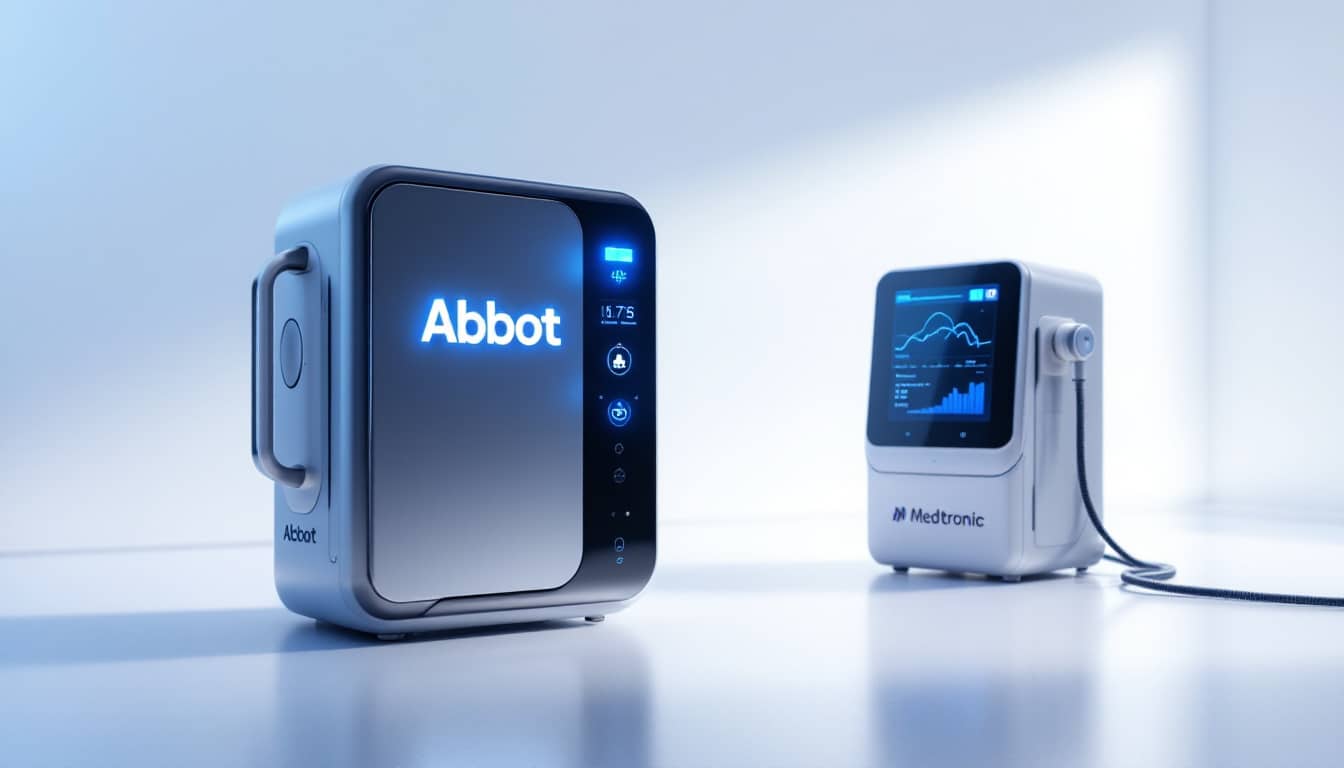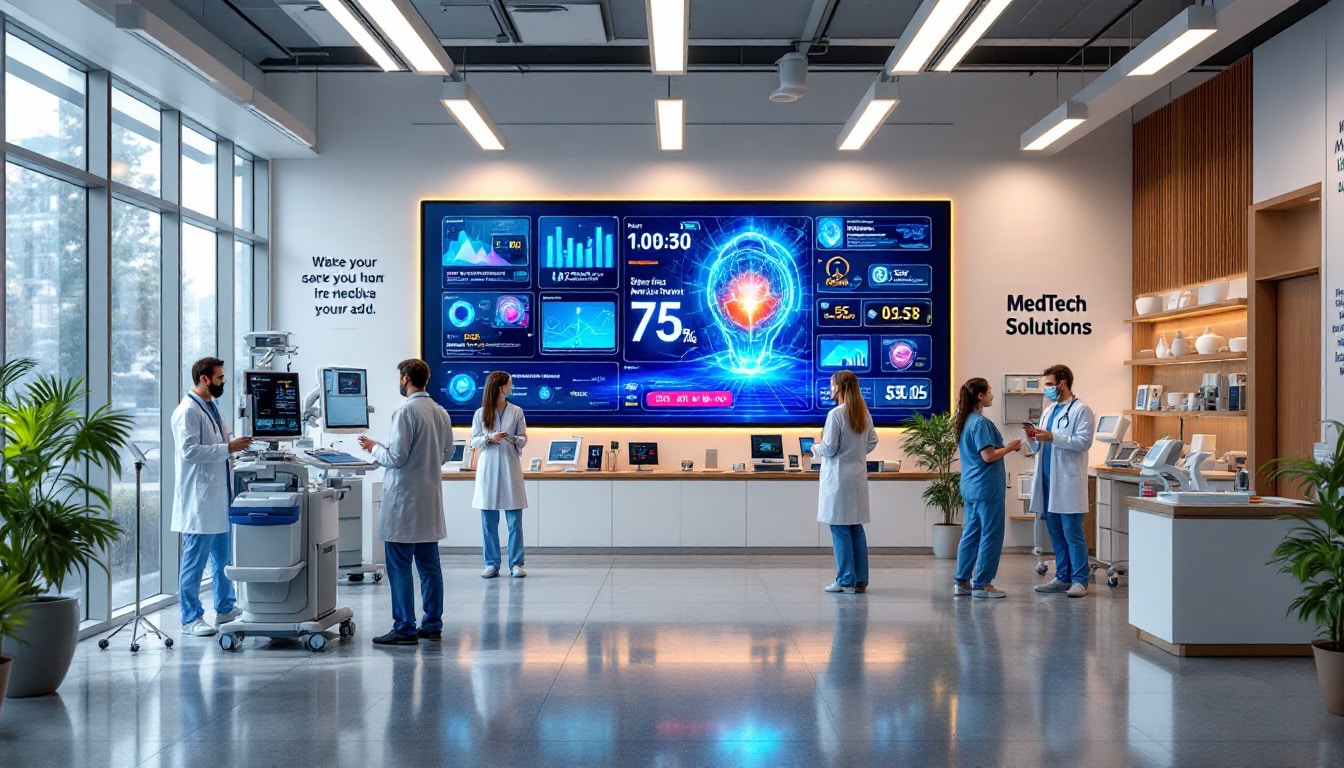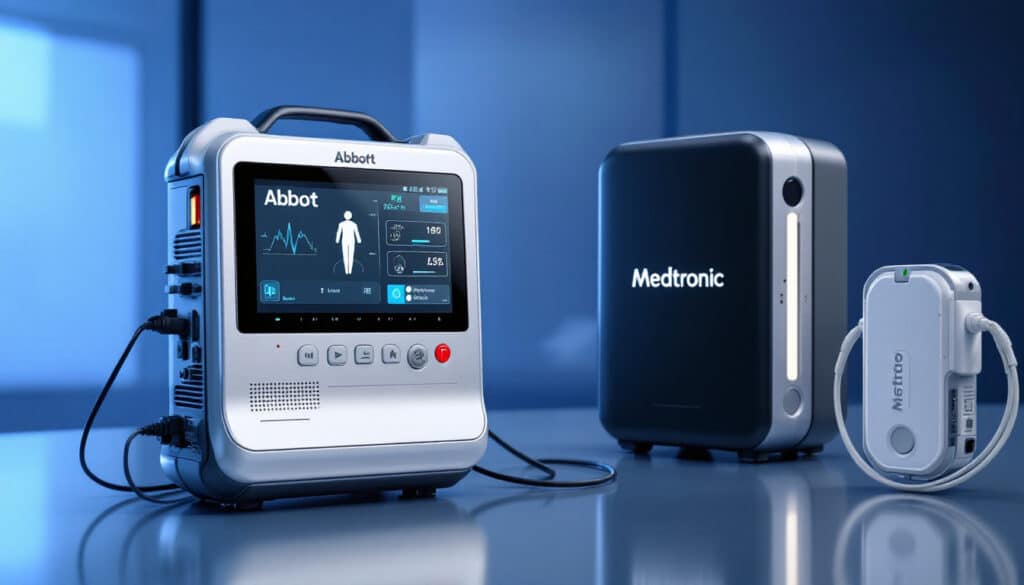The giants of the medical device industry, Abbott ABT and Medtronic MDT, display remarkable momentum in 2025. Despite significant macroeconomic challenges, including substantial pricing pressures, these companies continue to thrive. Their sustained performance demonstrates exceptional resilience and innovation.
Medtronic closed the first quarter of 2025 with an earnings growth of 10.9% and an improvement in revenues of 5.4% compared to the previous year, thanks to momentum in the cardiovascular, neuromodulation, and diabetes segments. The company reached new milestones with its cardiac ablation solutions and ENT activities exceeding $1 billion in annual revenues, while announcing a major strategic operation to separate its diabetes unit. Abbott, for its part, achieved high single-digit sales growth and double-digit earnings growth in the first quarter of 2025 despite ongoing post-pandemic disruptions. The company benefits from a comprehensive pipeline of innovations, expanded biosimilar agreements, and promising launches in diagnostics and neuromodulation. Since the beginning of the year, Abbott stock has surged 18.8%, while Medtronic shares have risen 6.5%, far exceeding the 0.8% gain of the S&P 500.

In the competitive world of medtech, two companies stand out for their performance and their ability to offer attractive dividends: Abbott and Medtronic. Each of these companies has its distinct strengths, making the choice between them complex for investors. This article explores the various facets of these two giants to determine which represents the best investment in terms of dividends and future prospects.
What is the recent financial performance of Abbott and Medtronic?
In 2025, Medtronic concluded its fiscal year with an earnings growth of 10.9% and an improvement in revenue of 5.4% compared to the previous year. This performance is mainly attributed to the cardiovascular, neuromodulation, and diabetes segments. The company achieved significant milestones, notably exceeding $1 billion in annual revenues within its Cardiac Ablation Solutions (CAS) and ENT divisions. Additionally, Medtronic announced a significant strategy to spin off its Diabetes unit, aimed at strengthening its focus on its areas of expertise.
On its part, Abbott recorded high single-digit sales growth and double-digit earnings growth in Q1 2025, despite ongoing post-pandemic disruptions. The complete pipeline of innovations, expanded biosimilar agreements, and promising launches in diagnostics and neuromodulation have been key catalysts. Abbott’s shares have surged 18.8% since the start of the year, far outpacing Medtronic’s 6.5% stock increase and the 0.8% average of the S&P 500.
How do diverse segments contribute to the growth of each company?
Diverse segments play a crucial role in the stability and growth of Abbott and Medtronic. For Abbott, the FreeStyle Libre franchise experienced organic growth of nearly 20% in Q1 2025, reflecting strong global demand and the growing importance of the product in managing type 2 diabetes through advanced digital health integration. The diagnostics segment showed stabilization, with organic growth in essential laboratory testing compensating for post-COVID declines.
Abbott’s Established Pharmaceuticals (EPD) segment reported organic sales growth in the mid-single digits, primarily driven by strong performance in emerging markets. Overall, Abbott has managed to generate organic sales growth across its four main business units: medical devices, diagnostics, nutrition, and EPD, thereby strengthening its diversified revenue base.
For Medtronic, diversification is also key to its performance. The cardiovascular and neuromodulation segments continue to grow, supported by ongoing innovations and increased demand for advanced medical solutions. The decision to spin off the Diabetes unit allows Medtronic to concentrate its resources on its most successful segments, thereby optimizing its future growth.
What is the financial health and cash generation capacity of both companies?
Financial health is a crucial indicator for assessing a company’s strength. Abbott displays a solid balance sheet with high liquidity, including over $6 billion in cash and short-term investments. This financial position gives Abbott significant flexibility to fund its organic growth and consider potential mergers and acquisitions (M&A) operations. In Q1 2025, Abbott generated an operating cash flow of $2.3 billion, demonstrating a robust capacity to generate cash.
Moreover, Abbott reaffirmed its commitment to shareholders by increasing its quarterly dividend by 7.8% earlier this year, marking the 52nd consecutive year of dividend growth. This long history of dividend growth positions Abbott as an attractive choice for investors seeking stable and growing returns. Abbott is also a member of the S&P 500 Dividend Aristocrats Index, which includes companies that have raised their dividend annually for 25 consecutive years.
In comparison, Medtronic also maintains solid financial health with a relevant liquidity margin, although Abbott appears to have an edge in terms of available cash. Medtronic has a balanced cash flow generation strategy, supported by high-performing segments, but the dividend increases are less pronounced than Abbott’s, which could influence income-oriented investors.
What are the competitive advantages of Abbott and Medtronic in the medtech sector?
Competitive advantages play a decisive role in the ability of companies to maintain their market position. Abbott benefits from a diversified portfolio covering key segments such as medical devices, diagnostics, nutrition, and established pharmaceuticals. This diversification allows Abbott to withstand market fluctuations and pursue stable growth. Ongoing innovation, particularly within the FreeStyle Libre franchise and diagnostics, positions Abbott as a leader in integrated and personalized health solutions.
On the other hand, Medtronic offers cutting-edge solutions in specialized areas such as cardiology, neuromodulation, and diabetes. Medtronic’s deep expertise in these key segments enables it to develop advanced technologies and remain at the forefront of medical innovation. The strategic decision to spin off the Diabetes unit also allows Medtronic to concentrate its resources on its most profitable segments, thus enhancing its operational efficiency and innovation capacity.
Another competitive advantage for Abbott is its strong global presence, supported by expanded biosimilar agreements and promising launches in diagnostics. Medtronic, for its part, benefits from its well-established reputation and ability to integrate advanced technologies into its products, allowing it to stay ahead of its competitors.
How does each company adapt to macroeconomic and regulatory challenges?
In an ever-changing macroeconomic environment, the ability to adapt to regulatory and economic challenges is essential. Abbott has demonstrated remarkable resilience in the face of post-pandemic disruptions through agile portfolio management and a continuous innovation strategy. Furthermore, Abbott actively manages health data restrictions, a major issue for the development of AI in medtech. These challenges are addressed through expanded biosimilar agreements and innovations in diagnostics, allowing the company to remain competitive and compliant with current regulations.
Moreover, issues of governance and compliance, such as the recent audit revealing embezzlement in Liberia concerning medtech revenues (see link), highlight the challenges that medtech companies face in terms of transparency and accountability. Abbott, with its solid reputation and rigorous governance practices, is well positioned to navigate these regulatory complexities.
Medtronic is also adapting to macroeconomic challenges through a diversification strategy and a focus on its highest-performing segments. The spin-off of the Diabetes unit is an example of this adaptability, enabling Medtronic to strengthen its key segments such as cardiology and neuromodulation. However, health data restrictions could hinder the development of AI technologies in medtech, an area where Medtronic needs to invest more to remain competitive.
What are the stock returns and future dividend prospects?
Stock returns and dividend prospects are crucial elements for investors seeking stability and growth. Since the beginning of the year, Abbott shares have risen 18.8%, far surpassing 6.5% from Medtronic and 0.8% from the S&P 500. This performance reflects investor confidence in Abbott’s ability to maintain stable growth through its diversification and ongoing innovation.
Regarding dividends, Abbott represents a particularly attractive choice with its quarterly increase of 7.8% and an impressive history of 52 consecutive years of dividend growth. This consistency in dividends makes Abbott a pillar for investors seeking stable and growing passive income.
Medtronic also offers attractive dividends, but with less dynamic growth compared to Abbott. Medtronic’s financial stability and high-performing segments ensure a regular flow of dividends, but long-term returns may be less impressive compared to those of Abbott. However, Medtronic remains a solid option for investors seeking exposure to advanced technologies in the cardiovascular and neuromodulation sectors.
What are the main challenges and future opportunities for Abbott and Medtronic?
Both companies face challenges and opportunities that will influence their future trajectory. Abbott must continue to innovate in its key segments to maintain growth and its leadership position. Expansion in diagnostics and nutrition, as well as health data management, represent significant opportunities for Abbott. However, the company must also navigate a complex regulatory environment and face increased competition in digital health technologies.
On its side, Medtronic benefits from opportunities in expanding its specialized segments like cardiology and neuromodulation. The spin-off of the Diabetes unit aims to strengthen these sectors, but Medtronic must also tackle the challenge of integrating new technologies and adapting to health data restrictions. Another major opportunity lies in the growing adoption of AI technologies in medtech, despite potential regulatory hurdles.
Both companies must also address challenges related to competition and rapid innovation in the medtech sector. Maintaining technological leadership and effective resource management will be crucial for their future success. Additionally, issues related to social responsibility and ethics, as evidenced by recent cases of embezzlement (see link), require rigorous governance policies and increased transparency.
Which company presents the best long-term growth potential for investors?
When it comes to choosing between Abbott and Medtronic for long-term investment, several factors need to be considered. Abbott stands out for its diversification, strong financial performance, and ability to consistently generate growing dividends. Ongoing innovation in key segments and effective management of macroeconomic and regulatory challenges position Abbott as a robust choice for long-term investors.
Medtronic, for its part, offers strong exposure to high-growth specialized segments and benefits from a well-established reputation in the industry. The spin-off of the Diabetes unit and the focus on advanced technologies such as cardiology and neuromodulation enhance its growth potential. However, Medtronic’s reliance on a few key segments and less dynamic dividend growth compared to Abbott may represent a limiting factor for some investors.
In conclusion, the choice between Abbott and Medtronic depends on the investor’s priorities. For those seeking enhanced stability with growing dividends and robust diversification, Abbott appears to be the best choice. In contrast, for investors interested in specialized segments and a strong capacity for innovation in specific areas of medtech, Medtronic represents an attractive option. Both companies offer solid advantages, but Abbott stands out for its superior financial performance and consistency in dividends, making it the preferred choice for a dividend-focused investment.
For more information on current issues in the medtech sector, check out the following articles:
Placing the voice of patients at the heart of innovation in medtech, Health data restrictions hinder the development of AI in medtech, and The Rafael Institute for Integrative Health: a biography in the field of medtech.













